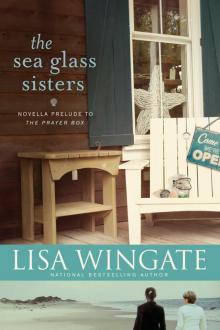- Home
- Lisa Wingate
The Sea Keeper's Daughters Page 2
The Sea Keeper's Daughters Read online
Page 2
Passing by her car on the way out, I couldn’t even look at her. I just bumped down the winter-rutted drive, turned onto the road, and headed toward home, checking once in the mirror to make sure Denise was out of the parking lot too.
Tagg Harper’s taillights came on just after her vehicle pulled onto the road. My anger flared with tidal force, and I was starting a U-turn before I even knew what was happening. By the time I made it back to the restaurant, Tagg was positioning his truck in the middle of the parking lot. Our parking lot. The driver’s-side door was just swinging open.
I wheeled around and pulled close enough to prevent him from wallowing out. Cold air rushed in my window, a quick, hard, bracing force.
“You even set one foot on this parking lot, Tagg Harper, I’ll call the police.” Not that the county sheriff wasn’t in Tagg’s pocket too. Tagg’s dumpy pizza joint was the spot where all the local boys gathered for coffee breaks … if they knew what was good for them.
Lowering his window, he rested a bulky arm on the frame, drawing the door inward a bit. The hinges groaned. “Public parking lot.” An index finger whirled lazily in the air. “Heard a little rattle in my engine just now. Thought I’d stop and check it out.”
“I’ll bet.” Of course he wouldn’t admit that he wanted to get his meat hooks on this place. He was probably afraid I’d be recording on my cell phone, trying to secure proof of the threats, the bribes to officials and contractors, the constant harassment.
Which was why he was smiling and blinking at me like a ninny now.
“It’s my parking lot, until this is all settled. We reserve the right to refuse service to anyone. You’re not welcome here.” Don’t back down. Not this time. Don’t let him bully you. Gripping the steering wheel tighter, I swallowed hard.
“Heard you were moving out early to save on the rent.” His breath drew smoke curls in the frosted air. I smelled beer, as usual. “Expensive to keep a building for no reason.”
“Well, you heard wrong, because we’ve got a hearing with the state code commission in six weeks, and with that little bit of extra time to prepare, there’s no way in the world we won’t win our case.”
His chin receded into wind-reddened rolls of neck fat before he relaxed in his seat, self-assured and smiling. He knew a bluff when he heard one. “It’d be a shame to drag yourself any deeper under … what with your other business to think about and all.”
What did that mean? Bella Tazza 1 was outside the county. There wasn’t anything Tagg could do to affect it, other than posting derogatory food reviews online, which he and his peeps had already done.
But he was thinking of something right now. That was clear enough. His tongue snaked out and wet his lips, and then he had the gall to give the mill building a leisurely assessment before turning his attention to me again. “Guess I’ll wait until the carcass cools a little more.”
Pulling the door closed, he rolled up his window, and then he was gone.
I sat alone in the moon shadow of my dying dream, once again feeling like the little girl who would never be worthy of dreams, the Benoit name, or anything else.
No matter how far I traveled, no matter what I achieved, that girl remained just a few inches beneath the skin.
Right now, she was telling me this was exactly what I deserved.
Rounding icy curves as the headlights glinted against dirty mounds of leftover snow, I had the urge to let go of the wheel, close my eyes, and just stay wherever the car came to rest … until the cold or carbon monoxide put an end to all of this. In some logical part of my brain, I knew that was an overreaction, but the idea of going broke and taking my cousin with me was unbearable.
There has to be a way out. There has to be something I can do… .
Yet no miraculous possibilities came to mind during the thirty-minute drive home. Finally, the surface of Lake Michigan glinted through the trees, and I looked toward it seeking the comfort it usually provided. This time, all I could see was a vision of myself, floating cold and silent beneath the surface.
Stop. That. The words in my head were a reprimand, strong and determined like my mother’s voice. You are not your father.
But occasionally over the years, I had wondered—was there, inside me, the same demon that had taken him from us before I was six years old, leaving me to remember him as a feeling, a snatch of sound, a mist of memory?
Could I, without seeing it ahead of time, come to a place where giving up seemed the best option?
How was the thought even possible for me, knowing firsthand the pain a decision like that leaves behind? Knowing what happens in the aftermath when a person you love enters the cold waters and swims out to sea with no intention of returning to shore?
Someone should tell the dead that saving the living isn’t as simple as leaving a note to say, It’s no one’s fault. For the living, it’s always someone’s fault.
Turning onto the cabin road, I cleared my head and felt the tears beginning to come, seeking to cleanse. Tears seemed like the only thing I had left. They swelled and pounded in my throat as I drew closer to the little lake cabin that had been home since I’d moved back to Michigan. Fortunately, Mrs. Doyne, who lived in the house out front, kept her cabin rentals at 1950s prices. She was more interested in having responsible, long-term tenants than in making money off the property.
Dressed in her nightgown and probably ready to turn in, she waved from behind a picture window as I passed by the house. One of her ever-present crossword puzzles dangled in her hand.
I had the random realization that even Mrs. Doyne would be hurt if I lost myself beneath the lake’s quiet surface. Get your act together, Whitney Monroe, she’d probably say. Life goes on. Mrs. Doyne had survived the death of her husband of fifty years, her one true love. She worked in her gardens, volunteered all over the area, and mentored a Girl Scout troop. She had the best attitude of any person I’d ever met and it went all the way through to the core. She was fearless, always up for a new adventure.
There had been a time when I’d thought that if I kept up the facade long enough on the outside, I’d become that on the inside, too. I’d opened world-class kitchens, driven others to maintain the pace, never let myself get rattled when a newbie on a hot line scorched a sauce or a waiter dropped a tray. I’d dealt with corporate higher-ups who weren’t much different from Tagg Harper—bloated, self-important personalities bent on showing the world how special they were. I handled things well. I had things under control.
But what I’d never been faced with, what I’d avoided my entire adult life, was the very thing that had been squeezing me dry these past months. I’d never allowed someone else’s well-being to depend on my own. Even during a short marriage that had both begun and ended with disaster, I’d maintained my own finances, kept my own life, and so had David. Both of us seemed to prefer it that way. I’d never been faced with the knowledge that my choices, my actions, my failure would destroy another person’s life.
Turning off the car, I rested my head against the steering wheel as the cold needled through the windows and the engine’s chugs settled to dull metallic pings. A sob wrenched the air and I heard it before I felt it.
A breath heaved inward, stung my throat. Another sob pressed out. I lifted my head, let it bump against the steering wheel, thought, Stop, stop, stop!
The knock on the window struck me like an electrical pulse, catapulting me upright. Beyond the blurry haze, I made out Mrs. Doyne’s silhouette against the security lamps, the fur-lined hood of her coat catching the light and giving her a fluffy halo.
My emotions scattered like rabbits, leaving behind only two that I could identify—horror and embarrassment. I didn’t want anyone to see me like this, least of all Mrs. Doyne. It would only worry her. She’d been a godsend to me these past few years, and even though I’d tried to keep my financial situation under wraps as Bella Tazza 2 imploded, she’d figured out that things were bad. She’d started bringing me casseroles and offering to wai
t for the rent if I needed her to.
Like everyone else in town, she wasn’t aware of the whole story. All she knew was that we’d had some trouble with the inspections on the new restaurant. I was careful not to reveal more. The truth about Tagg Harper’s underhanded dealings would only hurt her. Mrs. Doyne’s deceased husband had been one of Tagg’s favorite uncles and ice-fishing buddies.
Pretending to reach for my keys in the ignition, I wiped my eyes and then rolled down the window, hoping she wouldn’t notice what a mess I was. Apparently it was obvious, even in the dark.
“Oh, honey.” She touched my shoulder, and I clenched against another rush of tears. “I guess you heard. I’m so sorry …” She seemed to leave the sentence unfinished, its meaning a mystery. What was she sorry for? Did she know about the postponement of the code commission hearing? Had she been in it with the rest of the Harpers all along?
Even the question hurt. I’d come to think of Mrs. Doyne almost as a substitute for my mother. They enjoyed all the same things. They both loved music. They both played the violin. They had the same Upper Peninsula accent. Being around Mrs. Doyne was like having my mom back again. Mrs. Doyne was even a cancer survivor. Someone strong enough to defeat the disease that had taken Mom five years ago. It was after her funeral that Denise and I had reconnected and spent a long night talking about life, dreams, and Denise’s struggle to pay Mattie’s medical bills after her ex-husband refused to keep up the child support. Suddenly, the unexpected offer on my restaurant in Dallas had made sense. All of it seemed meant to be.
“Come on inside.” Mrs. Doyne’s hand circled my arm as if she meant to forcibly lift me out the window. “You look like you need a spot of hot tea.”
I didn’t argue. I didn’t have the energy. I just went along.
Inside, the house smelled of cats, baseboard heat, and plants in fresh pots. When this year’s rebellious spring weather finally warmed up, Mrs. Doyne’s garden would be half-grown in the sunroom. How could anyone who lovingly nursed the tender shoots of new life be in on Tagg Harper’s dirty dealings? The bullies were getting the best of me again, making me paranoid. I couldn’t let someone like Tagg make me lose hope in other people. Good people like Mrs. Doyne.
“Sit,” she said, leading me to a sofa space between three curled-up cats. “Let me put the water on.”
Sinking down with my cold fingers tucked between my knees, I let my head fall back, closed my eyes, tried to think. A cat crawled into my lap, nestled there, and toyed with the zipper on my coat, its soft purr a lull of comfort.
“I tried to call you earlier when I got the message.” Mrs. Doyne’s voice seemed far away.
Another month … can we hang on another month? There has to be some way to get the money… .
Options and options and options cycled through my mind, ending in brick wall after brick wall after brick wall, and then the biggest one of all—the fact that if we went any further with all of this, we risked losing everything.
You can’t do that to Denise. You can’t do that to Denise and Mattie and Grandma Daisy.
You never should’ve come back here. You never should’ve involved them in all of this. It’s your fault. It’s all your fault.
“I say … I tried to call you on your cell phone when the message came.”
Mrs. Doyne’s words pressed for a response.
“Message?”
The teapot whistled, the high, shrill sound causing the cats to stir.
A spoon clinked, the refrigerator door opened and closed. Cream and sugar. Mrs. Doyne knew. We’d shared more than a few cups of tea these past few years.
“It sounded as if the man had no idea who else to call. He left a message on the recorder while I was at the market. I suppose he found your cell number and reached you directly?”
Her slippers shuffled against the wood floor as she reentered the living room and handed over my tea. The cup was warm, comforting, its chamomile scent sinking in. “I left my phone in the car all afternoon.” I didn’t tell her I’d done that to avoid the constant flurry of bill collectors.
Mrs. Doyne delivered a perplexed look, settling into her recliner. “I know it isn’t the sort of news you need right now, what with your restaurant struggles.” Her head inclined sympathetically, her eyes compassionate behind thick glasses. “Are you close?”
“Close?”
“To your stepfather.” Frowning, she looked into her teacup, as if she might find the answers there. “I assumed not, given that the neighbor had so much trouble contacting you.”
“My stepfather?” The words struck like a ricochet baseball, drilling some unsuspecting fan in the head. I hadn’t seen my mother’s late-in-life husband since her funeral.
It was no accident that my stepfather’s neighbor had trouble finding my number among his belongings. The man wanted nothing to do with me.
“Mrs. Doyne, I’m completely lost here. I haven’t heard from my stepfather in almost five years. There’s no reason he’d be getting in touch, believe me.”
“Oh …” A hand-to-chest look of surprise. “When I saw you crying in the car, I just assumed the message had gotten through to you. I’m sorry to be the deliverer of such news. The call was from your stepfather’s neighbor on the Outer Banks of North Carolina … Roanoke Island, I believe he said. He thought you should know of the situation. Apparently your stepfather is in the hospital. He took a fall in the bathroom … and he laid there for nearly four days before anyone found him.”
“I know it sounds nuts. Just hear me out, Denise.” In better days, I might’ve rethought the idea, especially given Denise’s opposition to it, but right now I was elbowing doubts out of the way like a Titanic passenger trying to make it to a lifeboat. “Keep in mind that we’re talking about an old man who fell in the bathroom and was trapped for four days. Yes, I know that Clyde Franczyk isn’t just any old man, but I think I’m safe enough going there. Someone needs to, and obviously his sons still don’t have anything to do with him, or the neighbor wouldn’t be calling me.”
“So you’re … driving to the Outer Banks to save Clyde Franczyk? The man who hoodwinked your mother into leaving him what should’ve belonged to you?” Denise was halfway through prepping the morning bread-basket dough. A cloud of flour poofed from her hands as she flailed them. “Have you forgotten how he acted at the funeral—waving the will in our faces and telling us that we couldn’t come get any of your mother’s stuff?”
“Of course not.” Thanks to Clyde, the graveside service had ended up one step short of an all-out family brawl. “But that building in Manteo is still technically mine. Yes, he has the right to live there as long as he wants, but he can’t legally stop me from going in. I might not have been ready before, but it’s time to be ready. My mom begged me for years to go through my grandmother’s things. I just … didn’t have time to deal with it.”
“And now you’re going to … what? Just march right in there, sort the family heirlooms, sell some stuff, and sink the money into fighting Tagg Harper? Maybe you can talk your stepfather into shuffling off to a nursing home while you’re at it, so you can sell the building, too.” She coughed on a breath of flour dust. Her eyes were watering when she came up for air—watering and filled with doubt that I could handle the building and all that remained inside it, including Clyde. “Come on, Whit, this is the man who wouldn’t even let you see your mother’s body until the funeral service. At the very least, he’s selfish and possessive and mean. At the worst, he’s a con man and a crook. You need to stay away.”
“I need to go.” I didn’t want to do this without Denise’s blessing. I already felt like I was abandoning her by leaving Bella Tazza.
In reality, I didn’t want to go to the Outer Banks at all. Part of me—the old part that had traveled around the world, never staying long enough to form close associations—wanted to turn tail and run away to a whole new life. If it weren’t for Denise, Mattie, Grandma Daisy, and the Tazza employees, I could’ve done it. I wa
sn’t even forty yet. There was plenty of time to reinvent. The restaurant conglomerate I’d worked for would’ve taken me back in a heartbeat. I could land on my feet someplace far away, let life go on without a thought about Clyde Franczyk and the old waterfront hotel that held almost a hundred years of the difficult, often tragic history of my father’s family.
“Believe me, Denise, I’ve thought this through. In the first place, there’s more than one possibility here. At his age, Clyde would be better off if he’d reconcile with his sons and move back to Raleigh. Maybe I can help to make that happen. Not that they like me either, but Mom always hoped she could do something to mend those fences. She felt like she was the cause of their issues even though she didn’t mean to be.”
“So you’re doing this for your mom now?”
“It’s the best thing for everyone involved. And whether Clyde can be reunited with his family or not, there isn’t just the building in Manteo to think about; there’s all the stuff in storage on the second floor. My dad’s family was very well off. Grandmother Ziltha came from money, and she married a Benoit. The Benoits had shipping interests all over the Eastern Seaboard. You can’t imagine what was in the penthouse residence when Mom and I worked all those summers at the hotel. There’s no telling what might be left.”
Denise quirked a brow, her lips forming a narrow, skeptical line. “Whitney, based on what happened at the funeral, you’re liable to get shot. And have you even considered that Clyde may have sold anything of value? The man is perfectly happy to live upstairs for free, and collect the rent on the retail space downstairs. Who says he’d stop there?”
“I won’t know until I see for myself.” My spine and my resolve stiffened. “I have to try to do what I can, Denise. It’s what my mom would’ve wanted, and it could make the difference for all of us.” I swept a hand toward the empty kitchen, where our hard work was evident in every nook.
Denise portioned dough into glutinous blocks, dropping them on rack sheets as she mulled her answer. “I don’t know. Thinking of you going to Manteo gives me a bad feeling. Maybe some of that’s just the history. I was always jealous of you and your mom, taking off to spend summers on an island. It sounded so romantic—ghosts and sea captains and all that stuff. But I’m also being honest here. I’m worried about this and I’m worried about you. I’ve been worried for a while. Have you thought at all about the fact that you’re not just talking about old family heirlooms in that building? Your mom’s personal belongings are there. You haven’t visited that place since … Whit, the Excelsior was the last place you saw her before she died. Are you sure you’re … in the right frame of mind to be going there now?”

 Before We Were Yours
Before We Were Yours A Sandy’s Seashell Shop Christmas
A Sandy’s Seashell Shop Christmas The Book of Lost Friends
The Book of Lost Friends Larkspur Cove
Larkspur Cove The Sea Glass Sisters
The Sea Glass Sisters The Language of Sycamores
The Language of Sycamores Dandelion Summer
Dandelion Summer Word Gets Around
Word Gets Around Beyond Summer
Beyond Summer Firefly Island
Firefly Island The Tidewater Sisters: Postlude to The Prayer Box
The Tidewater Sisters: Postlude to The Prayer Box Talk of the Town
Talk of the Town![Blue Sky Hill [01] A Month of Summer Read online](http://i1.bookreadfree.com/i1/03/29/blue_sky_hill_01_a_month_of_summer_preview.jpg) Blue Sky Hill [01] A Month of Summer
Blue Sky Hill [01] A Month of Summer A Thousand Voices
A Thousand Voices Over the Moon at the Big Lizard Diner
Over the Moon at the Big Lizard Diner Never Say Never
Never Say Never Good Hope Road
Good Hope Road The Summer Kitchen
The Summer Kitchen A Month of Summer
A Month of Summer Blue Moon Bay
Blue Moon Bay Drenched in Light
Drenched in Light The Sea Keeper's Daughters
The Sea Keeper's Daughters